






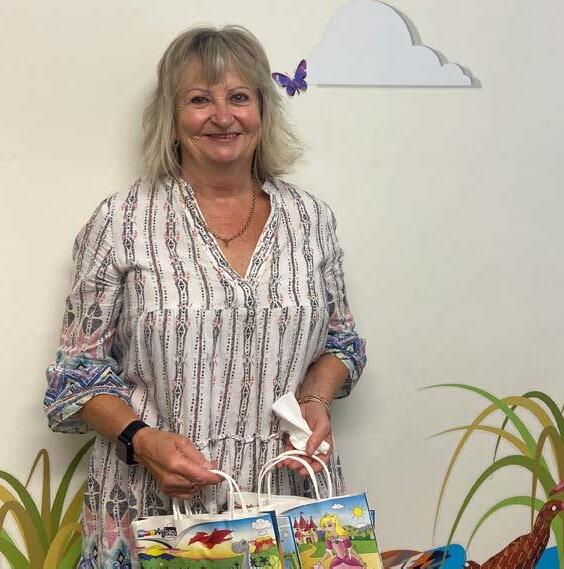


Kupu Arataki – Introduction... pg 3-8
Ā mātou tāngata – Our people
› Fun activity gift for tamariki receiving immunisations... pg 9
› One minute with… Stephen Southcombe, Allied Health Assistant... pg 10
› Akoranga Toru – Lesson #3... pg 11
Whakamihi – Bouquets... pg 12–13
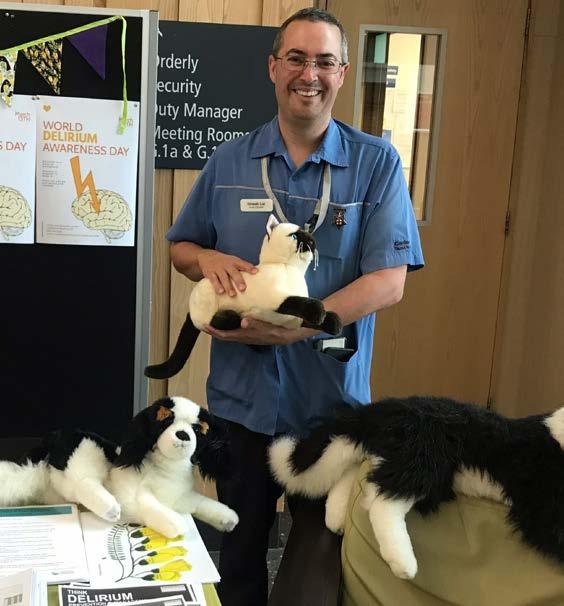
Ā mātou korero – Our stories
› Kurawaka: Waipapa blessed in moving ceremony... pg 14–15
› Marking Brain Awareness Week... pg 16–19
› Art for a cause – new mural to raise awareness of Rānui House... pg 20–21
Pānui – Notices... pg 22–23

Canterbury Waitaha Paediatric Surgeon Kiki Maoate has been appointed as the new Chair of Fatu Fono Ola (the National Pacific Health Senate).
Fatu Fono Ola is an independent advisory board of 11 senior Pacific clinicians from across the country, which provides strategic advice and supports Health New Zealand | Te Whatu Ora to deliver more equitable health outcomes for Pacific peoples. Kiki has been part of the group since it was established in January 2023.
Born and educated in the Cook Islands, Kiki is a specialist paediatric surgeon and paediatric urologist with Health NZ. He is Associate Dean Pacific at the University of Otago Christchurch School of Medicine, President of the Pasifika Medical Association Group and Chairperson of the Pasifika Futures Ltd, Pasifika Whānau Ora Commissioning Agency.
Kiki says Fatu Fono Ola provides an opportunity to have a direct impact on Pacific health outcomes from the policy and programme design level.

“We need all people to be able to access the healthcare they need. My role and that of my fellow Fatu Fono Ola members is to provide scrutiny and assistance to help make sure our Pacific people can navigate the health system with confidence and safety.”
The countdown to the official opening of Kurawaka: Waipapa, the new central Christchurch birthing unit, took a step closer last Friday with a moving blessing ceremony, attended by iwi representatives, Health New Zealand | Te Wahu Ora staff and stakeholders involved in the project.
The new unit, which is on track to open next month, is expected to see up to 2000 births taking place each year, and will enable Christchurch Women’s Hospital to focus on those who need more support or are at high risk.
Kurawaka: Waipapa is located at the corner of St Asaph and Antigua streets, just minutes away from Christchurch Women’s Hospital.

Go to page 14 to read more and see photos of the blessing ceremony.

The Health New Zealand | Te Whatu Ora Voluntary Bonding Scheme is open for registrations of interest until 16 April, with an expanded range of opportunities for this year’s intake.
The scheme provides financial incentives for new or recent graduates in eligible health professions who are starting their career, to encourage them to work in eligible hard-to-staff communities or specialties. A range of professions and specialties are covered in the scheme, including nurses, midwives, pharmacists, anaesthetic technicians and GP medical trainees, across many parts of Aotearoa New Zealand.
This year the scheme has been expanded to include all new graduate midwives, new graduate anaesthetic technicians working in public sector hospitals, new or recent graduate pharmacists and rural and regional general practice trainees.

Those accepted to the scheme can become eligible for payments in the first three to five years of their career, to help repay their student loan or as top-up income.
Check our website for more information and details on the specific professions, roles and locations eligible under the scheme.
Increased funding is now available to support midwives who want to return to practice. The Midwifery Return to Practice programme has been in place since 2021, providing funding to support former midwives back to practice. Following a review the level of funding has been increased, which will help to address current pressures and reduce the gap in the midwifery workforce.
The level of funding and recertification requirements vary depending on the length of time a midwife has spent away from practice. Assistance is available for midwives who have spent three years or more away from practice and hold New Zealand citizenship or New Zealand residency. Funding is distributed locally, and anyone interested is encouraged to contact their local Director of Midwifery or Return to Practice lead.
More information and details of eligibility and criteria for the Return to Practice programme are available online


Good hand hygiene, food safety and caution around swimming are being encouraged after a recent increase in cases of the stomach bug cryptosporidium (crypto).
National Clinical Director for Protection Susan Jack says the number of cases of crypto notified to public health services since the beginning of the year was more than three times the average over the last five years.
“In approximately half the cases where information is available, those who became unwell with symptoms had been involved in swimming-related activities – with the majority of cases happening in urban areas, particularly within the Auckland, Canterbury and Waikato regions,” says Susan.
“These cases highlight the importance of people avoiding using swimming pools, splash pads, rivers, lakes and beaches for at least 14 days after they’ve had diarrhoea or other crypto symptoms – as well as keeping up with the other public health advice, including good hand hygiene to prevent spreading the bug to others.
“This means washing your hands with soap and water for at least 20 seconds and drying them thoroughly with a clean towel every time you go to the bathroom and before preparing food.”
Cryptosporidium is a parasite found in the gut that can cause diarrhoea and stomach cramps.
People become infected when they swallow the parasites, usually in contaminated drinking water, or in shared water such as swimming pools.

It can also spread by contact from infected people or animals – including cattle, sheep, dogs and cats, and from infected people’s hands, to surfaces, toys, food and water.
Crypto is a common cause of acute diarrhoea in children, so it’s especially important to keep children at home if they’re unwell.
There is no risk from public drinking water supplies.

Which teeth do you need to brush? The ones you want to keep! Taking care of your oral health means you’re protecting your overall health too.
This Wednesday (20 March) is World Oral Health Day, and it’s a good time to check these tips to help keep your smile in shape:
› Brush your teeth twice a day with fluoride toothpaste and floss once a day
› Reduce how much sugary food and drink you have
› Stay hydrated by drinking plenty of water
› Quit smoking – it’s bad for teeth and gums as well as for your general health
› Visit your dentist at least once a year
› Chew sugar-free gum

For families, it's also important to take care of your baby's teeth, as healthy baby teeth are needed for chewing and proper speech development. Healthy baby teeth usually mean healthy adult teeth too, so it's especially vital you look after your child's first teeth.
For more information and advice:
› Learn more about taking care of your oral health
› Tips on looking after your kid’s smile
Like many public and private organisations across New Zealand, Health New Zealand | Te Whatu Ora has been affected by compliance issues with the Holidays Act 2003.
We are reaching out to past employees of district health boards who may not have been paid correctly for leave.
If you worked for a former district health board or shared services agency after 1 May 2010, you may have been paid incorrectly for your leave. We’re committed to addressing these issues, to ensure current and former Health NZ staff receive their correct leave entitlements.
If you’re a former employee, please register your details online through our secure national portal. We will keep you posted about any payments that may be owed to you. For current employees, you can read more on your local intranet.
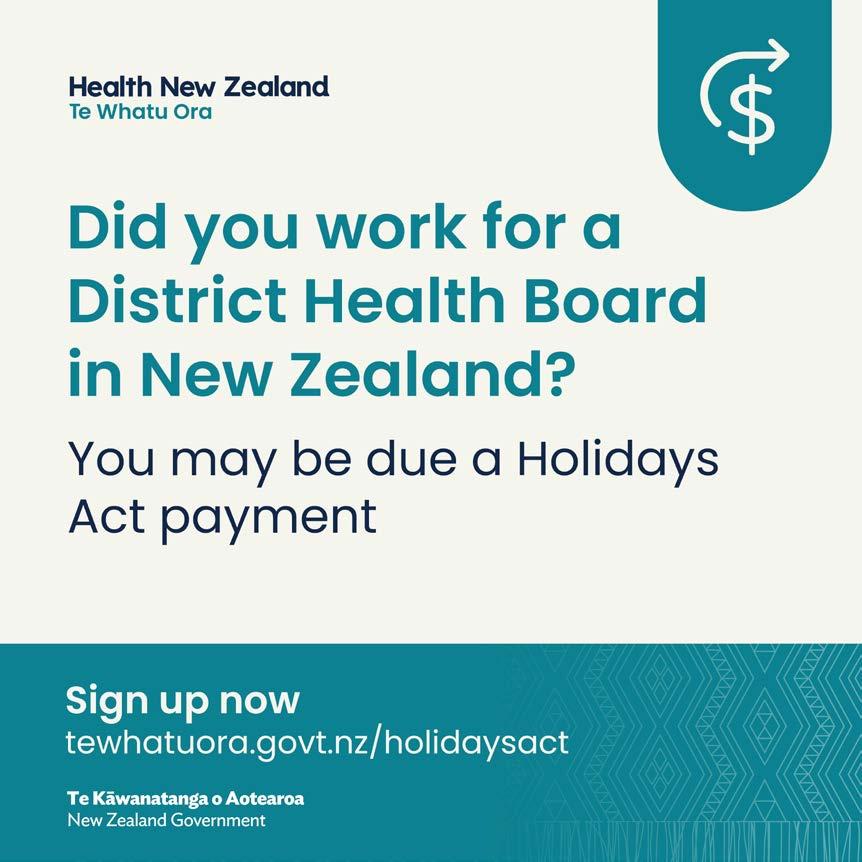
Find out more and register your details online: Holidays Act Remediation – Te Whatu Ora - Health New Zealand

Did you enjoy a good night’s sleep last Friday? It was World Sleep Day – a reminder that we spend around a third of our lives asleep, but a lack of good sleep can negatively affect our daily lives and longterm health in significant ways.
Lack of sleep, or poor quality sleep can reduce your reaction time, alertness, and ability to solve problems or remember things.
If you are experiencing the effects of poor sleep, making a few changes to your daily habits can make a big difference. Try these strategies from Healthify to help you sleep better at night:
› Set your body clock – go to bed and get up at the same time each day, including weekends.
› Wind down at bedtime – have an hour of quiet time before bed: switch off your device, read, have a bath or listen to music.
› Avoid stimulants – don’t smoke, drink alcohol or caffeine, eat a heavy meal or do energetic exercise within two to three hours of bedtime.
› Make your bedroom suitable for sleep – keep it cool, dark and quiet and use it only for sleep and sex.
› Reduce blue light exposure (phones and computers) in the evening – it disrupts your body clock, causing poor sleep.
› Get up if you can’t sleep – if you can’t sleep after 20 minutes or so, get up and do something boring until you feel tired, then try again. Don’t lie in bed getting frustrated.
› Avoid naps – don’t sleep during the day, go to bed earlier in the evening instead.
› Be active in the day – take regular daytime exercise and get outside early to help set your body clock for a good night’s sleep.
› Use an app – try an app or online sleep programme; check here for information on apps
If these measures don’t help, visit your doctor to discuss whether you need other treatment. Check here for more advice on common sleep problems
A new cyber security training site is now available for Health New Zealand | Te Whatu Ora staff. KnowBe4 is the site where kaimahi can find short training videos on phishing, portable storage and using mobile devices.
The information will help you spot malicious cyber activity at work and at home.
Staff can access the training by logging in to KnowBe4 – a work email address may be required to login.
More training courses can be found under the library tab, and people can go through the training at their own pace.



Part two of our series with Kevin Walls from our Career Transition team, offering practical steps and strategies to relax and reenergise your mind, body and soul as we head into autumn. If you missed part one (tips 1-4), you can catch up here.
5. Have a digital detox
The more time we spend on our devices, the more problems we create for our mental, emotional and physical wellbeing. Studies show that excessive use of smartphones creates an imbalance in brain chemistry, with negative effects on our social and emotional development and mental wellbeing. Every time you pick up your smartphone, your brain is bombarded with information that it has to filter, make sense of and store. Just imagine for a moment how relaxed you would feel if you took a short detox break to unwind from social media, stopped being accessible 24/7 and allowed yourself just to be.
6. Get creative
Creativity in any form, whether it’s art, craft, gardening, pottery, sewing or other activities, is a great way for our minds to recharge. Indulging in a creative activity has a calming effect and encourages the brain to release dopamine, the feel-good happy hormone. Creativity helps to reduce anxiety, depression, and stress. Allowing time to express yourself through creative activities is a wonderful way to feel good about yourself, which in turn slows down the negative self-talk that we can have. It can help build your self-esteem as you create and believe in yourself to try something new.
7. Look for opportunities to daydream
As children we daydream all the time, but as life gets in the way and things get busy, we are either deep in our work, surrounded by to-do lists or buried in our smartphone. Giving time and space for our minds to wander allows the brain to process information, boosts creativity and problem-solving skills and relieves stress. When we stop taking in so much information and allow the brain to catch up, it can quickly recharge our minds and allows us to return to our lives more refreshed and energised and ready to take on new information.

8. Clearing your mind by journaling
A great way to get things out of your mind and onto paper is to write in a journal. So often we can feel overwhelmed from trying to figure something out or solve a problem. Putting things down on paper creates relief and space in your mind, and also provides a new perspective that you might not otherwise have seen, which could possibly change the outcome. Journaling boosts memory and comprehension, clarifies your thoughts and emotions and can help you further understand why you think and feel the way you do.
So, go for it! Whether you do just one or a number of these steps, it’s up to you, but your future self will thank you for trying out new ways to enhance your wellbeing over the coming months.
Courtesy of Kevin Walls, Career and Transition Centre Manager
Every year Burwood Hospital Volunteers Inc. have grants available for patient comfort.
Vision and Hearing Administrator at the Public Health Nursing Service (PHNS) Rose Watson successfully applied for funding from this grant for two boxes of ‘Smartybags’ colouring-in activity packs for tamariki who come into the service for immunisations.
“The Public Health nurses and Vision and Hearing Service staff and administrators are champions for all the care, love and support they provide for our tamariki both here on the Burwood campus and in the wider community,” she says.
“These activity packs will greatly assist and distract anxious children being vaccinated.”
The PHNS, which is staffed by registered nurses, vision and hearing testers and a support team of administration staff, supports the delivery of B4 School checks by offering appointments in the community and they can do vaccinations at the same time.
The check aims to identify and address any health, behavioural, social, or developmental concerns which could affect a child’s ability to get the most benefit from school – such as a hearing problem or communication difficulty.
It is the eighth and final ‘Well Child’ check a fouryear-old has before they start school.
The PHNS, which offers support to children, young people, and their families across all schools in Waitaha, is based at the Burwood Hospital campus. Public health nurses are also based at rural facilities including Ashburton, Rangiora and Kaikōura.


What does your job involve?
Maintaining and enhancing consumers’ quality of life by supporting skill-building and community engagement. This involves doing things like assisting them with their weekly shopping, going to communitybased activities such as church or volunteer groups, doing community work, and visiting places like beaches or parks. With the consumers’ permission I sometimes take photos of these experiences so they can show others.
What pathway got you to this job?
Helping people in the community from previous jobs. When I became an Allied Health Assistant, I finally found my dream job!
What advice would you give someone keen to enter your field?
Be prepared to have fun! Think outside the box and keep the consumers as the focus.
Who inspires you and why?
My mother, who I lost in October last year. I am inspired by her attitude towards life and raising me to be a better person. Also, the people who I care for inspire me. That twinkle in their eye and that smile on their face when they’re enjoying themselves despite their current situation.
What do Waitaha Canterbury’s values (Care and respect for others, Integrity in all we do and Responsibility for outcomes) mean to you in your role?
By showing respect, compassion, and empathy, to gain the trust and confidence of the those we care for and showing this in our actions and the way we enhance their quality of life.
If you could be anywhere in the world right now where would you be and why?
Honestly, I feel like I am already where I need to be. This position gives so much back to me, both personally, and mentally. I love seeing the smiles on the consumers’ faces and the positive feedback from staff about how enthusiastic consumers are about their outings.
Who would you want to play you if there was a movie made about your life, and why?
Matthew McConaughey, because, just like me he looks at life as … alright, alright, alright! That’s his catch phrase that says everything with his life is okay. At this point in my life that’s pretty much the same for me.
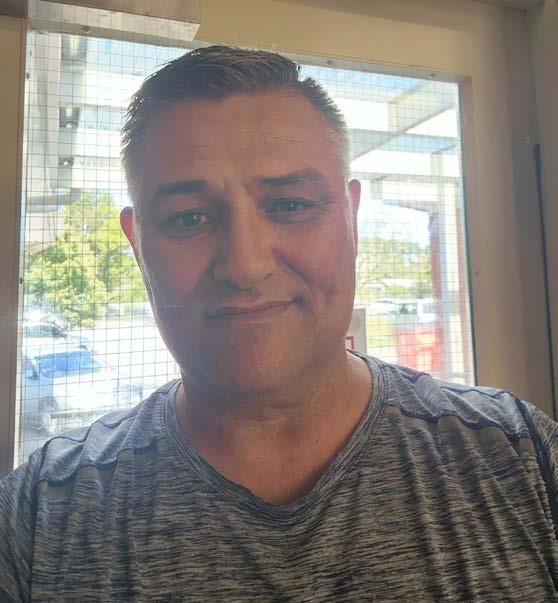
What are some of the ways you and your whānau show their aroha/love for our planet?’ Recycle, recycle, recycle! Putting back into the earth what we take out.
What are your hobbies/interests outside of work?
I love landscaping and now that I have my own home, I am creating my dream and looking forward to the end result. I also play rugby in the winter, and softball in the summer.
If you would like to take part in this column or would like to nominate someone please contact Naomi.Gilling@cdhb.health.nz

E ngā kāwai nui, e ngā kāwai roa, tēnā anō koutou. To the great lines of descent, to the long lines of descent, greetings once again.
As we progress through ngahuru (autumn), our days are becoming shorter and cooler as we leave the summer months behind. For this month, we are going to learn some kupu reo Māori (Māori words) and terms to describe a few issues, illness and diseases that tāngata (people) within our healthcare services might be experiencing.
Ate kakā Hepatitis
Hauā pekewhā Quadriplegia
Hiku whēkau kakā Appendicitis
Kā Burn
Kāpō Blind
Katirehe Quinsy/sore throat
Kōangi Diarrhoea
Kutukutu Delerium
Manawa hē Heart attack
Māngina Intoxicated, stoned
Matapōuri Depressed
Mate huka Diabetes
Mate hūkiki Epilepsy
Mate iaia-roro Cerebrovascular disease
Mate karawaka Measles
Mate miru pupuhi Emphysema
Mate roma mimi Urinary tract infection
Mate ū Mastitis
Pakiwhara Sexually transmitted infection
Pāmamae Grief, pain, distress
Pukuruaki Bulimia
Tūkino Abuse
Turi Deaf
Whakatō Transplant
Whakaora Resuscitation
Whati Fracture
Are any of these relevant to your area of mahi (work)? If they are, did you know about these kupu? Or did you know of some other kupu Māori used for a particular mate? There are often multiple words to describe one thing in te reo Māori. If you have someone who speaks Māori in your service who is experiencing one or some of the above (or a colleague), try referring using the kupu Māori. If none of these applies to you or you want to rangahau (research) something different, try Te Aka (the Māori Dictionary) online. You could create a vocabulary list specific to your work area for yourself and your colleagues to use.
Karawhiua! Give it heaps!
I mōhio rānei koe? Did you know?
On the 28 Māehe (March) 2004 Māori Television launched with the aim to inform and educate while broadcasting predominantly using te reo Māori. It has grown to become very popular with greater than 50 percent of the viewing audience being non-Māori.
Kua mātakitia e koe? Have you watched it?
Māori Television launched | NZHistory, New Zealand history online
Tēnā koutou – Nā koutou i whakatuwhera i a koutou anō kia ako tonu ai e pā ana ki tō tātou reo taketake.
Thank you – for being open to continue to learn about our indigenous language.
If you have any questions or feedback, please make contact via the email below. Hauora.Maori@ cdhb.health.nz


Nuclear Medicine, Christchurch Hospital
Absolutely wonderful, kind, and caring staff. Appointments ran to time also. Thank you for a wonderful experience.
Neurology (EEG), Christchurch Hospital
Thank you, the head massage was great, and the technician was lovely.
Eye Clinic, Christchurch Hospital
A totally seamless experience from the first reception, through all the optometric tests and a delightful conversation with Professor Elder. We hear many complaints about the health system and not enough about the positives.
Intensive Care Unit (ICU), Christchurch Hospital
Our son is being cared for in ICU, the staff are amazing, and we really appreciate them. We would especially like to mention Dennis and Neil. Thank you so much.
Ward A3, Christchurch Hospital
You all were wonderful! Keep up the good work with all your heart!
Ward A3, Christchurch Hospital
The staff in Ward A3 are amazing and deserve a treat! Especially, Michael, Jithu, Nathan, April, Aimee, and Karen.
Ward A4, Christchurch Hospital
Amazing nursing staff looking after [patient name] – so kind and respectful, and patient, when he tried to run, before he could walk. Many thanks for taking such amazing care of him. You guys are the best!
Ward A8, Christchurch Hospital
Thank you so much for your care of my husband while he was in your Vascular Ward. Your love and care were so attentive and caring. The nurses and physiotherapist were kind and helpful. The surgeon, Mr Khanafer and his assistant were so skilful.
Thanks for the amazing work you all do.
Ward A4, Christchurch Hospital
I would like to acknowledge how great the staff are in Ward A4. They have been looking after my husband and have been so patient, reassuring, and helpful in what is a busy department. Dave has a great sense of humour and kept my husband upbeat, and Wayne – I don’t think I have ever seen such a calm and reassuring manner; constantly talking to my husband, telling him what all the next moves were when moving him. It was so reassuring listening to him.
Our first visit to Burwood was tremendous. All the staff at were well versed in their respective roles, from the reception staff to the prep nurse and Dr Kirk Williams, they were most obliging and helpful. The café staff were very good too! The piano playing as we left added to the relaxed ambience. The car parking was excellent too.
Jemma, Northcote Community Dental Service
I was blown away by the incredible Dental Therapist Jemma at the Northcote Community Dental Clinic. She has a great way with kids and really put my seven-year-old son at ease when he needed treatment this week. She was gentle, kind, caring and made the whole experience fun! She took the time to explain what she was doing in a childfriendly way, so my son knew exactly what to expect. She was also great at communicating with me, the parent - I couldn't fault her. She is a real asset to your team. Thanks again Jemma.
Ward FG, Burwood Hospital
In late 2023 I was admitted to Burwood Hospital for an operation on my face and leg to remove skin cancer. On arrival from the friendly admission desk, I was instructed to go to the ward. I noted the beautiful design of the building with wide corridors and plenty of windows. At the ward I was warmly welcomed and taken to my individual room. Everything was explained in a warm and friendly manner. I stayed for eight days, the service I received from everyone was professional, nothing was any problem. This includes the meals (which were delicious), and the morning and afternoon tea which were all served with a warm and caring smile. The cleaning staff apologised for having to clean around me. The total service was five gold-star treatment.
Oromairaki Community Maternity Unit, Rolleston
We had such an amazing few days at the Rolleston birthing unit. All the midwives were incredibly caring, supportive, and very capable. From arriving during labour right through to being discharged, we were met with such kindness and patience. They were prompt to respond to any calls and could gauge when we needed a bit of space or some more support. The facilities themselves were also impeccable. We are very blessed to have been able to receive this level of care. Thank you so much.
Ward 11, Christchurch Hospital
Just wanted to acknowledge how incredible the care from the nurses in Ward 11 has been during my week-long stay. I have felt safe and important, and they have always been so kind and prompt as well as professional with everything they do. The nurses are just awesome and have helped my time here seem a little better.

Emergency Department (ED), Medical Assessment Unit, and ICU, Christchurch Hospital
I really wanted to pass on how marvellous staff were when I was admitted to ED earlier this year, then the Medical Observation Unit and ICU. I cannot praise the staff enough in these three teams for the spirit in which they delivered care. They were kind, compassionate, patient-focused and manaenhancing. All staff treated me with dignity and respect, though I was far from being at my best. Particularly in ICU I noticed that despite the intensity of care, staff never rushed or acted as if there was a crisis. They were calm and measured. Their interactions conveyed reassurance. I was very impressed with how every staff member in ICU who connected with me appeared aware of my needs, the goals of treatment and the focus of care at that time. Communication between staff appeared to be exceptional. I want to thank the nurses for their kindness - for the one who washed my hair as I lay in bed unable to move under the respiratory mask; for the doctor/consultant who saw my fear at the thought of being intubated and gave me a little bit more time to respond to treatment; for the collaboration of several specialists (from ICU, Infectious Diseases, Respiratory and Rheumatoid Arthritis departments) who collaborated to arrive at a diagnosis and treatment plan. Thank you for your investment in determining the best way forward for me. I cannot overstate how fabulous the teams in the three departments were. I am incredibly grateful for the quality and wairua of care received.
Emma, Ashburton Hospital
I would love to compliment the service provided by Emma Irwin. She has been my dietitian for several years. Recently her valued knowledge has given me relief from a condition I have suffered over many months. Emma is caring. She gives her full attention and not only offers sensible advice and imparts professional advice, but she keeps my health in check. I believe as a patient I am so very fortunate to have her as my dietitian. With my medical history it isn’t easy. Emma is an absolute star and I just want to say how much we are fortunate to have her in Ashburton. Thank you.
A blessing ceremony last Friday at new Christchurch birthing unit Kurawaka: Waipapa was a moment brimming with emotions, laughter, and heartfelt messages.
The ceremony was led by Ngāi Tūāhuriri, who along with Health New Zealand | Te Whatu Ora Waitaha Canterbury staff and members of the mana whenua, gathered to bless the new facility. They were joined by Māori Midwives ki Tahu and student midwives.
The ceremony, led predominantly by the wahine representatives of Te Ngāi Tūāhuriri, was about honouring the efforts of all those involved in the unit's creation, construction, and adornment. With each karakia, the spirits of the ancestors were invoked to bless the walls that would witness the miracle of birth and to sanctify the ground where new life would be welcomed.
The sounds of Taonga pūoro (Māori musical instruments) filled the air, their melodic vibrations sweeping away any lingering shadows of the past. It was a cleansing, a rejuvenation, a preparation for the sacred journey that awaits within those walls. As the echoes faded, a sense of serenity settled over the gathering, a silent acknowledgment of the magnitude of the moment.
Amidst the solemnity, there was also joy. As the last prayers were offered, and the last blessings bestowed, the gathering dissolved into a celebration and kai was shared.
Delivered by the Infrastructure and Investment Group (IIG) and the facilities team with close engagement with the mana whenua and the community, the ceremony at Kurawaka: Waipapa marks a significant milestone in Christchurch's journey towards holistic birthing care.

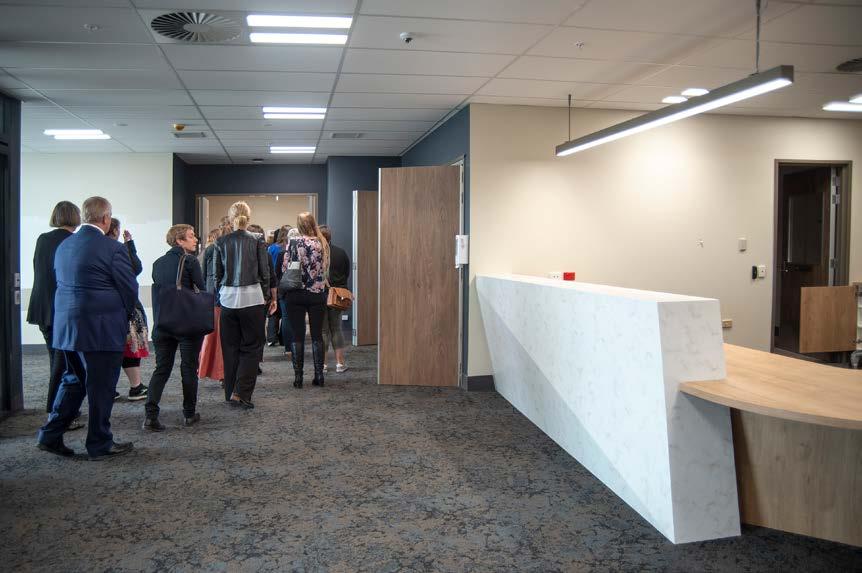



With commissioning work well underway, the team is now adding final touches and getting Kurawaka: Waiapa ready to open its door to the community by 16 April. The unit is located at 238 Antigua Street, a few minutes away from Christchurch Women’s Hospital.
More information about our birthing options in Canterbury can be found here

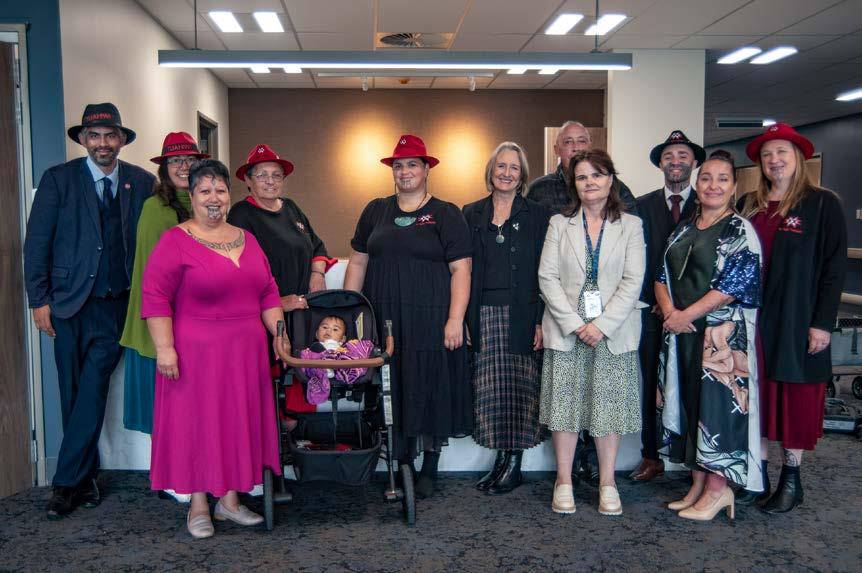
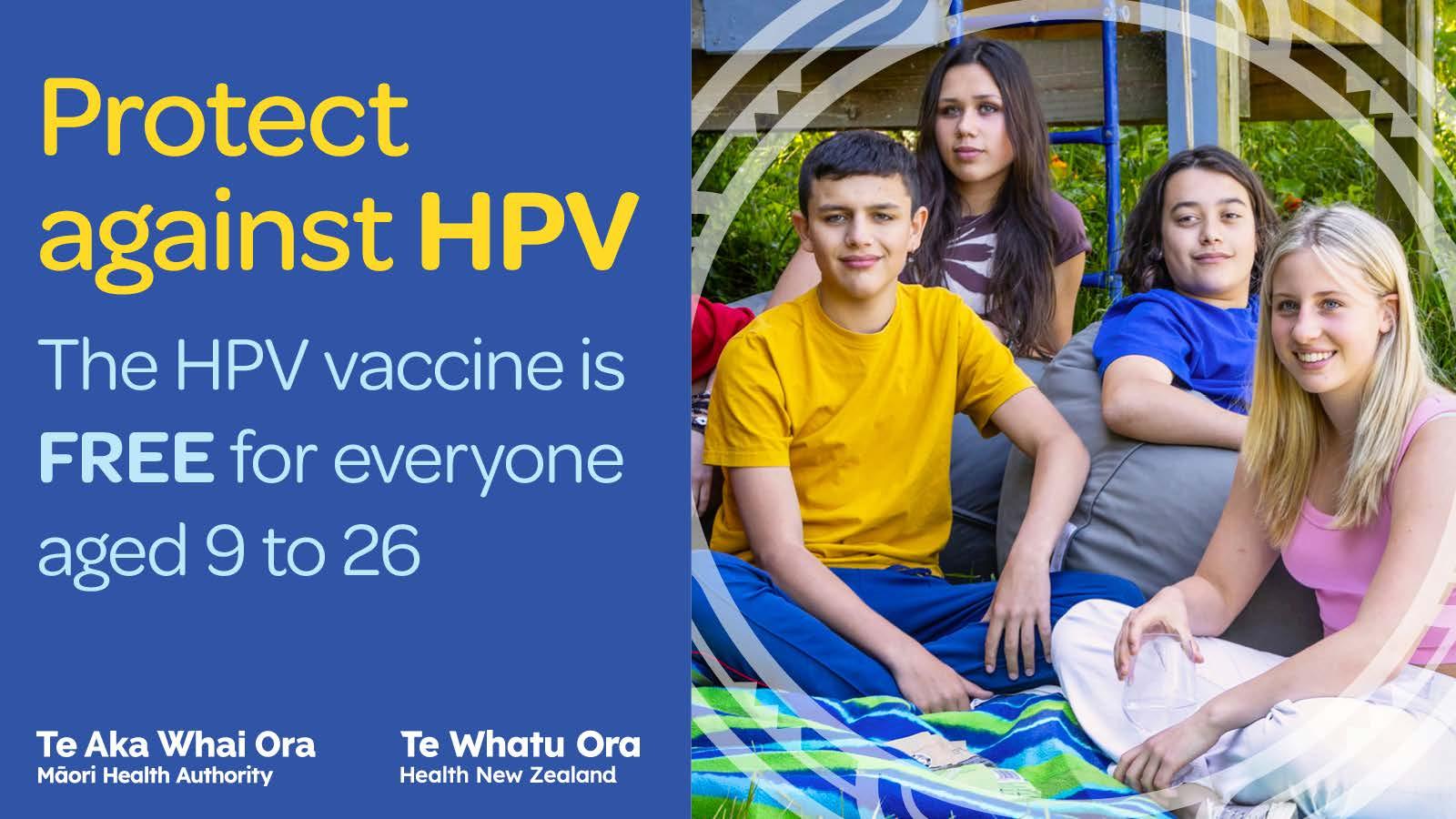

Brain Awareness Week is a chance to raise awareness of delirium, dementia, and other neurological conditions and the role we can all have in supporting brain health.
It unites organisations around the world in a week-long celebration of the brain every year in mid-March. This year’s Brain Week was marked by a number of exciting initiatives from Health New Zealand | Te Whatu Ora Canterbury Waitaha staff.
Brain Week has become an annual event at Burwood Hospital. This year’s information expo involved displays on brain health, aphasia, delirium, stroke, heart disease, and dementia.
A highlight of the week was the cupcake bake-off, with a competition for the cleverest brain health decorations and tastiest health cupcakes.
One of the organisers from the Burwood Dementia and Delirium Group, Older Persons Mental Health (OPMH) Researcher Susan Gee, says they were blown away by the support from staff and their families.

“We had an amazing array of goodies that raised over $800 towards an upgrade of our outdoor spaces, and we love having Jordan Luck from the Dance Exponents as an integral part of the event.
“His involvement happened after one of one of our team spotted the rock star charisma of Jordan at Burwood one day and took a chance to invite him to be our celebrity judge. Jordan has lived experience with a neurological condition within his whānau and he’s been a great supporter every year since.”





World Delirium Awareness Day was the perfect time for General Medicine to celebrate the recent release of two new delirium resources: the lightbulb Floview icon and new Whānau Delirium Information leaflet. Staff in four of the General Medicine wards and Medical Assessment received brain cakes and delirium quizzes to mark the occasion.
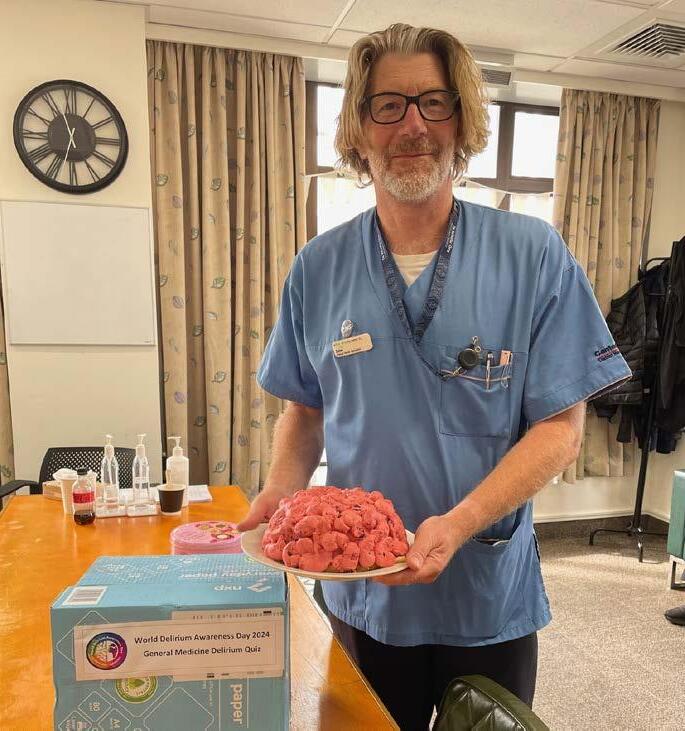


Occupational Therapist and Dementia Educator
Tracey Hawkes knows how much being outdoors means to her personally and is passionate about bringing opportunities to patients, whānau, and staff.
“We know from research that nature and gardens can not only help people to de-stress, they can actually help patients’ recovery, sleep, mood, you name it.”
That’s the thinking behind an ambitious plan to upgrade an under-used internal courtyard at Burwood Hospital into a multipurpose therapeutic area.
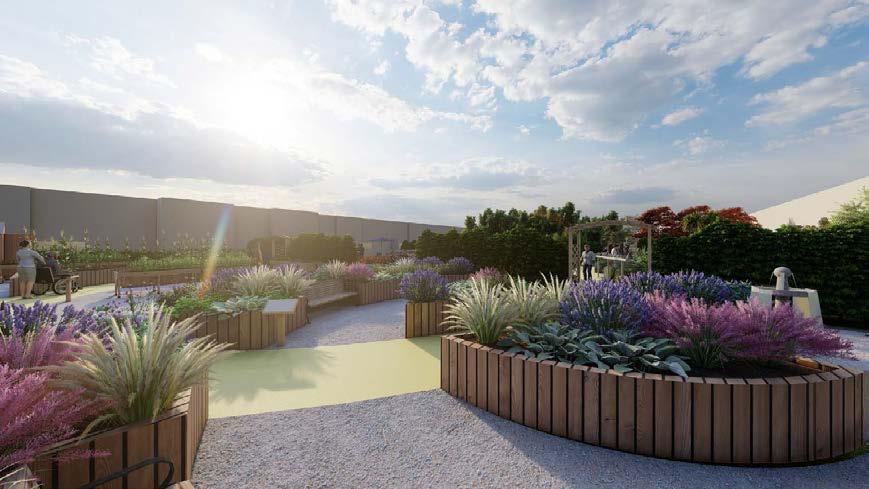
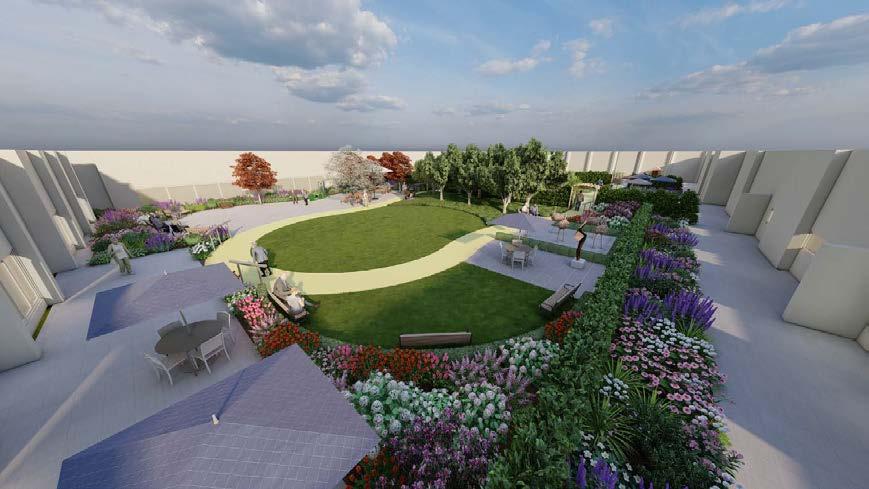
It will be the first of its kind in New Zealand, Tracey says.
A figure-eight coloured walking track will link a series of garden areas or zones: a sensory garden. a native garden, an active area, a memory garden modelled after a 1960s home garden, a hands-on vegetable garden, and a covered area with seating. With fundraising beginning, Tracey says that the endeavour has been given a huge boost by the support of a Burwood Hospital Volunteers grant.
“We’re on our way now and ‘I’m going to be out there watching those diggers and celebrating all day when we break ground!”



World Delirium Awareness Day is an annual event held during Brain Awareness Week to raise awareness about delirium and its impact on patients, families, and healthcare systems.
For Health New Zealand | Te Whatu Ora clinical staff, new and updated 'delirium toolkit' resources are available under clinical resources on a dedicated Dementia and Delirium web page here.
This includes a new Delirium Prevention brochure for whānau launched on World Delirium Awareness Day.
Geriatrician Val Fletcher says this is a positive step in raising awareness about the importance of recognising delirium and what can be done to prevent it.
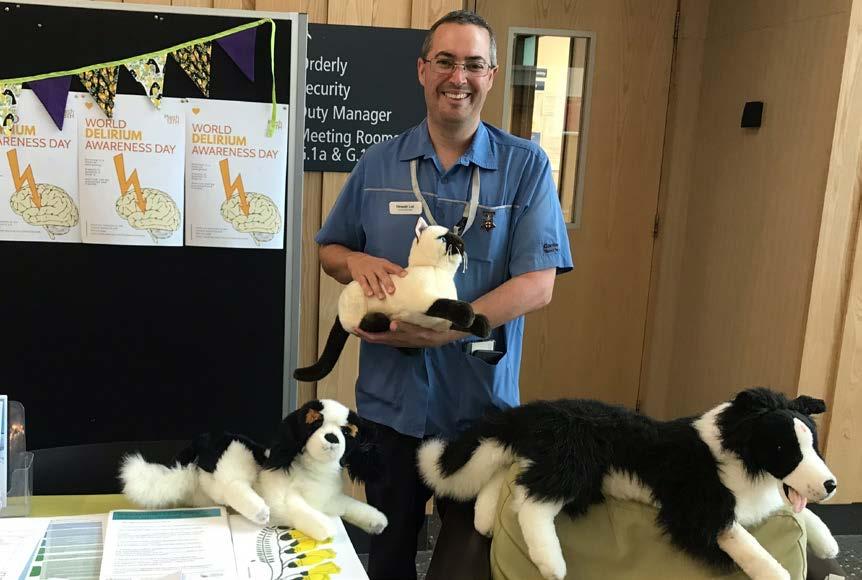
“This handy resource makes it easier for whānau and staff to work together to ‘think delirium’. It joins a range of important resources that are available to ‘print your own’ on the intranet.
"Part of the focus of this work is to improve the quality of the care we are giving to patients and their families by reducing the likelihood of their loved ones getting delirium and detecting it when it happens. It's also about helping to support those who do get it, throughout the whole experience,” she says.
The hospital can be a stressful place for a person living with dementia and their supporters says OPMH Researcher Susan Gee.
“Being admitted to a hospital, away from your familiar surroundings, routines, and support network, can be confusing and distressing Seeing the person being distressed in the hospital can cause a great deal of stress and worry for whānau too.”
The Burwood Hospital Delirium and Dementia Committee have produced a guide to help whānau feel less anxious about a stay at Burwood Hospital for someone they support living with dementia.
“We are the first hospital in New Zealand to be accredited as working towards being dementia-friendly.
We know that the knowledge and participation of whanau is an important part of ensuring that everybody feels supported and comfortable and has the best possible outcomes. This booklet is one way we can make sure whānau feel welcomed and safe as an essential part of the team!”.
The booklet is called “The Hospital Handbook: A guide to supporting someone living with dementia during their stay in Burwood Hospital” and it’s available for Health NZ staff to print from the Dementia and Delirium intranet clinical resources hub here.

A new art installation is taking shape in central Christchurch with the artist behind it donating her time towards a worthy cause.
The bright and bold 12-metre long mural is being created on the fence outside Rānui House on the corner of Cashel Street and Cambridge Terrace. Local illustrator Kyla K, the artist behind it, is donating her time and hoping to raise awareness of Rānui House, while also spreading joy to everyone who passes by.
Rānui House is a 26-apartment complex that provides a home away from home for patients and their families who travel to Christchurch hospitals for life-saving medical treatment. It is owned and managed by the Bone Marrow Cancer Trust – the official charity partner for this year’s Frontrunner Christchurch Marathon.
The mural is expected to give runners taking part in the marathon an energy boost as they make their way past it and they are being encouraged to also ‘Run for Rānui House’.
So far close to $28,000 has been raised thanks to 48 generous individuals who have pledged their support for the fundraising mission. You can sponsor them here. If you’re planning on racing –why not Sign up to Run for Rānui
The team in the Bone Marrow Unit at Christchurch Hospital are taking part under the name of ‘Bad to the Bone Marrow’. The team has already raised an impressive $2,500 and is currently second on the leaderboard.
Kyla says the mural is a very special project for her. To create it she called upon the talent of Distranged Design Street Artist Jacob Root and Paul Walters from Identity Signs.
“I figured I might need some help, and Jacob and Paul didn’t hesitate to say yes. They have talent in



spades, so I’m really excited to be working in with them on this piece.”
The mural will feature the phrase “Run your Style” and depicts a range of characters running in unique ways.
“I wanted to draw a lot of different characters, most of them inspired by real-life people, to represent how we are all built differently as humans. For example, I’ve drawn a character who is skipping with butterfly wings on, that’s because when I was in high school, I used to skip my way through crosscountry. I wanted to show that it doesn’t matter how you run – it's the fact that you’re doing it that’s worth celebrating,” she says.
Greymouth two-time leukemia survivor Josh Komen is also depicted in the mural. He and his family spent 474 nights at Rānui House while he was receiving treatment for Acute Myeloid Leukaemia, a type of cancer of the blood.
“Reading about Josh and his story, I thought what an amazing, inspiring human he is, so it was really important to me that he was part of this creation.”
Komen, who is taking part in the Run for Rānui House fundraiser, says when he saw the designs for the mural he couldn’t take the smile off his face.
“I love the design and the bright colours. To me, it radiates hope,” he says.
Bone Marrow Cancer Trust Chief Executive Mandy Kennedy says she owes a debt of gratitude to Kyla for her generosity.
“This beautiful mural is more than just paint on walls – it's a symbol of the collective commitment of our community to making a positive difference. It really will bring so much joy to the families staying with us, the runners on marathon day, and of course the community of Ōtautahi and visitors to our beauitful city.”
The creation of the mural is currently underway, with the timing of its completion dependent on weather over the coming days.
A video about the mural can be found here

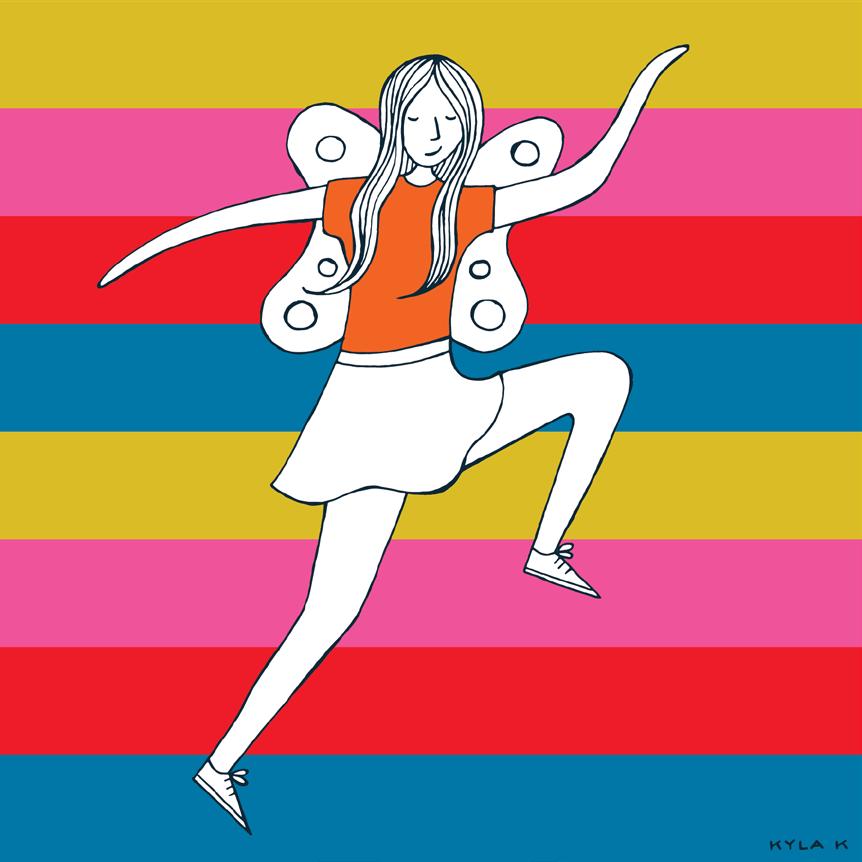
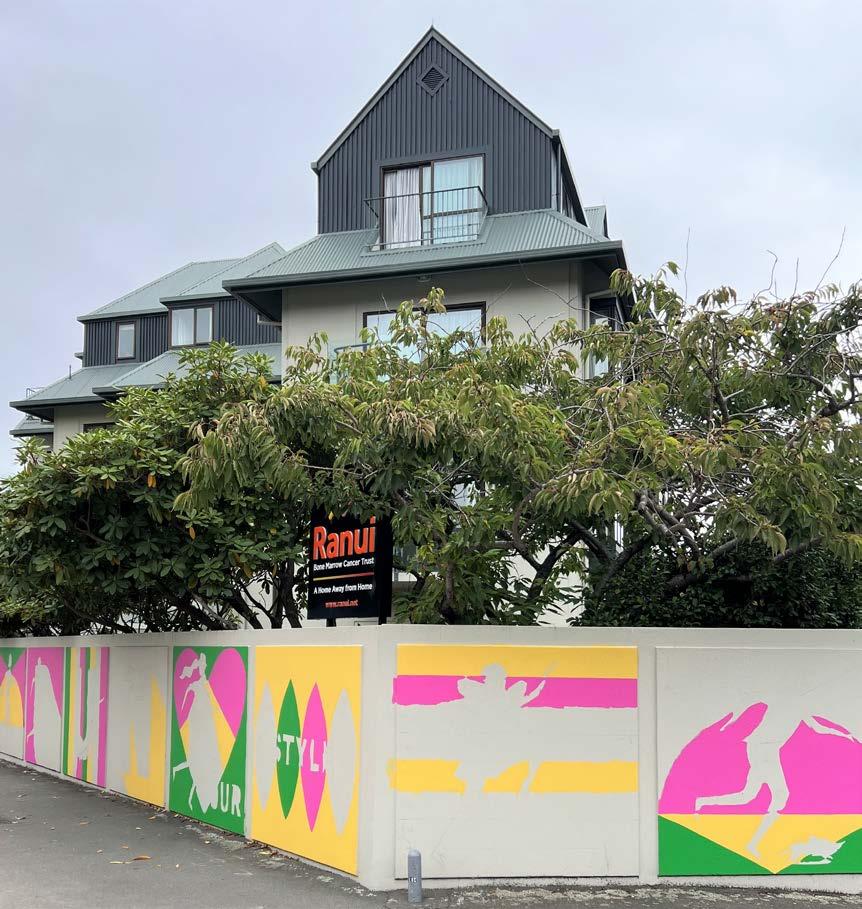


Tēnā koe,
We are excited to share our upcoming MIHI 501 short courses offered by the University of Otago, Christchurch. These professional development courses are designed to empower health professionals with the knowledge and skills necessary to effectively apply hauora Māori competencies in a clinical setting.
You will be introduced to the Hui Process and Meihana Model – both are established frameworks that allow health professionals to provide appropriate care and treatment for Māori patients and their whānau in a way that promotes genuine partnership, steers clear of tokenism and creates a pathway to advocate for Māori health equity.
Developed by leading Māori and non-Māori health researchers and clinicians, our courses are designed to be flexible and accommodate your busy schedule. Choose between a 100% online course, or blended learning with online modules and a one-day immersive workshop held at our Ōtautahi/Christchurch campus.
Course overview:
› Each of the five online modules take approximately two hours to complete
› Modules are comprised of written material, videos, and interactive quizzes.
› Course costs range between $500 and $1500 depending on your profession and delivery mode.
› Spaces for the kanohi ki te kanohi/face-to-face workshops are limited.
› Online modules can be started at a time to suit you. Visit our website for the workshop dates.
For more information and to register, please visit otago.ac.nz/mihi501
Feedback from participants:
"This has been an excellent course with engaging and effective kaiako. I feel that it has given me more confidence when caring for Māori patient and their whānau – this should be compulsory for all health professionals!”
"The online modules were informative and didn't even feel like studying, I just love the topics raised. I also really enjoyed learning in the face-to-face module as well as the excellent teaching from facilitators."


Come and find out…
Workplace Support's Wellbeing team at Burwood invites all Health New Zealand | Te Whatu Ora staff to a conversation on how to develop good sleep patterns.
This is a space for you to talk over and identify some of the thoughts and habits around sleep and see what works and what doesn't.
The Wellbeing team can be contacted via email, office@workplacesupport.co.nz to arrange individual sessions.
You are invited to drop in to see us anytime on Wednesdays 11am-1pm. You can find us in the Workplace Support Wellbeing Room, by the old Burwood entrance and ambulance bay.
We look forward to working with you towards a good night’s sleep.